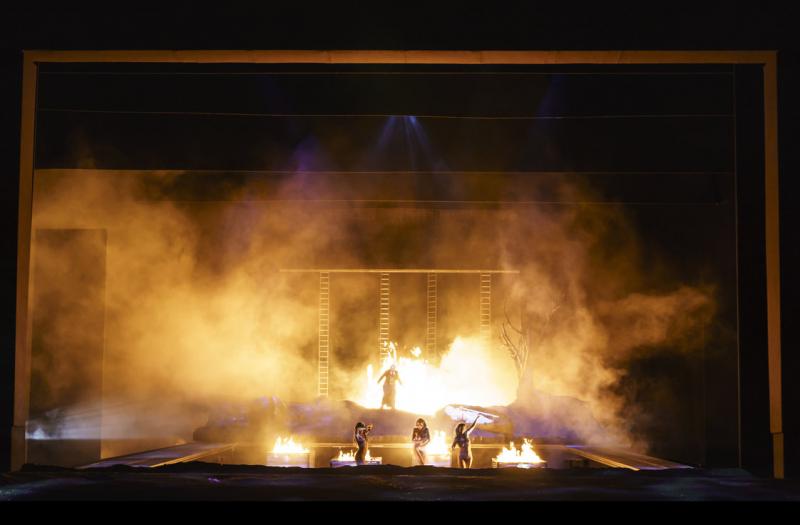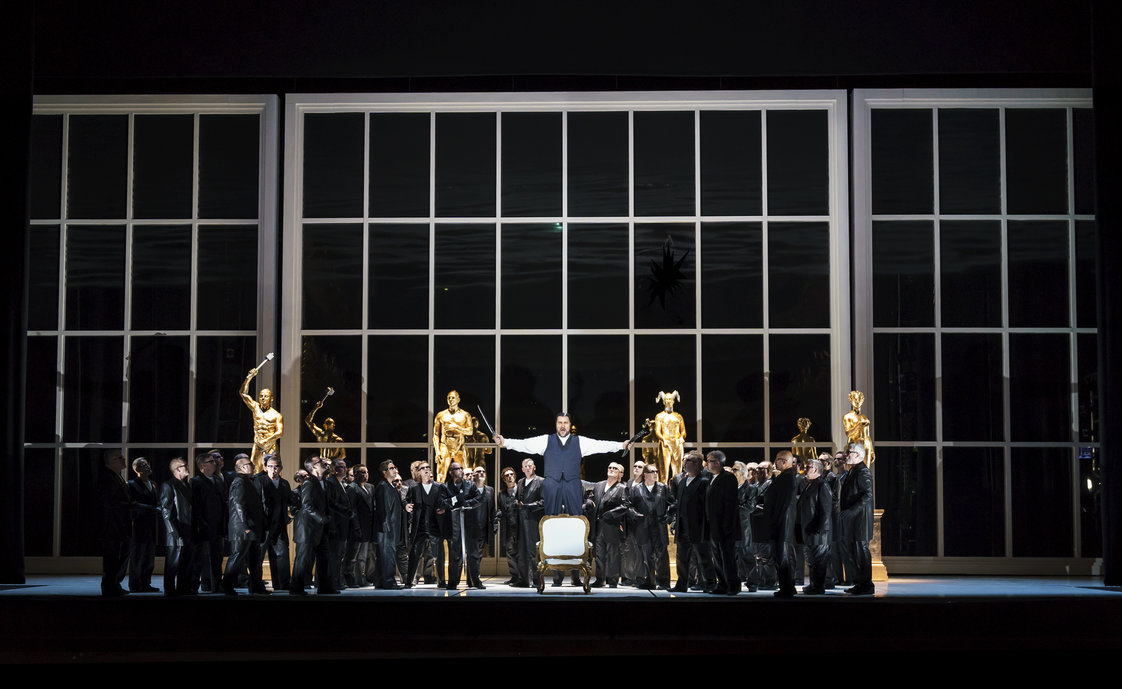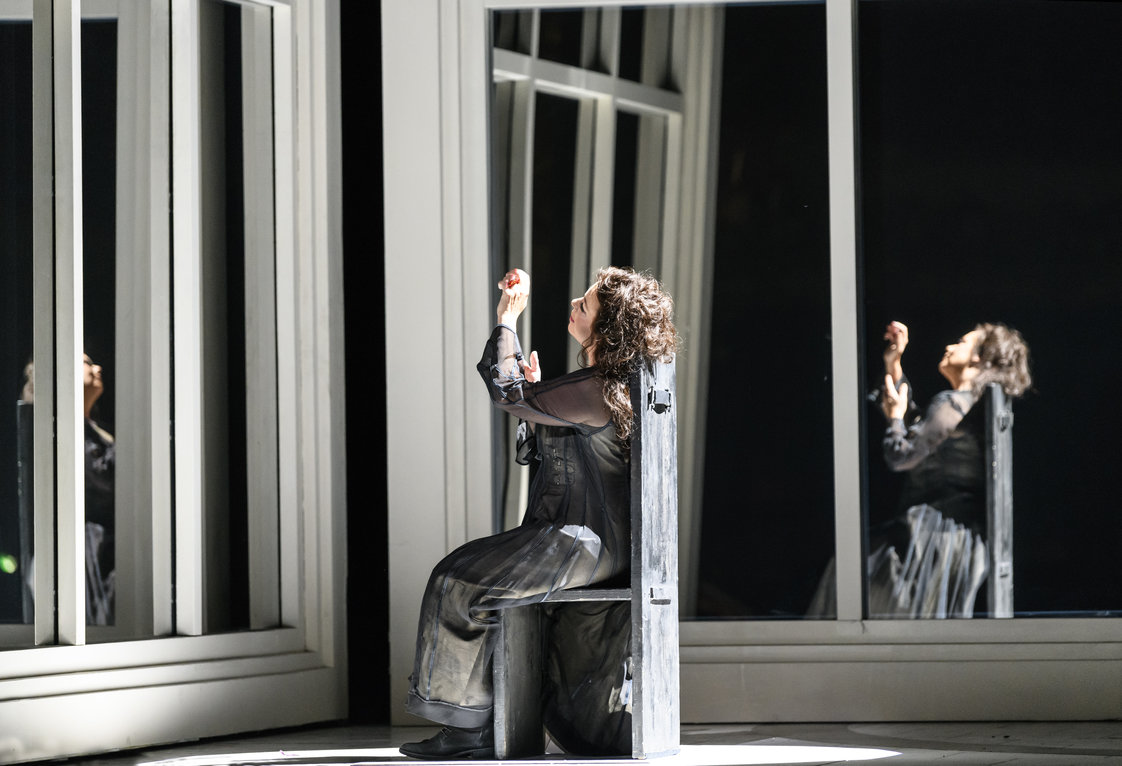Götterdämmerung, Royal Opera review - a fiery finale to this ambiguous cycle | reviews, news & interviews
Götterdämmerung, Royal Opera review - a fiery finale to this ambiguous cycle
Götterdämmerung, Royal Opera review - a fiery finale to this ambiguous cycle
A strong cast welcomes doubts and possibilities in this closing episode of Wagner's epic

And so it ends. Flames give way to water, and as the Rhinemaidens resume their naked dance we come full circle – quite literally in Keith Warner’s Wagner Ring – back where we began, on the banks of the Rhine. Once again we find ourselves on the brink – but of what?
Third time round, and still things remain – for good or ill – ambiguous in Warner’s staging. Admittedly in Götterdämmerung the clutter does begin to clear. Symbols painstakingly loaded with meaning over the previous three evenings seem to shake themselves free, and we move from something close to allegory to a free flow of images and ideas. There’s an exhilaration about it, a playfulness almost, as Warner and his characters seem to dance on the brink of the abyss.
Vocally both Stemme and Vinke romp home
The visual punchline of the Gibichung Hall – revealed in Stefanos Lazaridis’ design as a giant twin of the Tarnhelm, all mirrored panels and sleek illusion – still hits hard and accurately, and the giddy, eagle-eye view of Siegfried’s journey down the river, travelling not just through space but time, as huts give way to tower blocks and cities, is a moment of pure visual pleasure among some rather austere stage pictures.
Things take a more sinister turn with Gunther’s kinsmen (pictured below, the first appearance in the cycle for the Royal Opera Chorus – putting all their considerable power into this short episode). With The Handmaid’s Tale freshly in mind, the bonnets and aprons of the cringing women, and shiny black helmets of the men who cluster like a well-funded mob around Brünnhilde, seem more oppressive than ever – just the better-dressed cousins of the slaves down in Nibelheim. But in this final instalment, where focus finally shifts from objects to people (I do wonder just how much of the fiddly, prop-centric activity in the earlier instalments is clear from the amphitheatre), it’s the cast that make or break. After the ardent first flushes of love in Siegfried (thrillingly rendered here, by all accounts) it’s here that we get down to the everyday business of a relationship. There are some telling details in Brünnhilde (Nina Stemme) and Siegfried’s (Stefan Vinke) negotiations, her insistent affection, his obliviousness – eyes already onto the next adventure. It’s a brief but crucial moment of vulnerability for Stemme before we see her steel herself for vengeance and self-sacrifice, a flash of flesh under the impenetrable armour.
But in this final instalment, where focus finally shifts from objects to people (I do wonder just how much of the fiddly, prop-centric activity in the earlier instalments is clear from the amphitheatre), it’s the cast that make or break. After the ardent first flushes of love in Siegfried (thrillingly rendered here, by all accounts) it’s here that we get down to the everyday business of a relationship. There are some telling details in Brünnhilde (Nina Stemme) and Siegfried’s (Stefan Vinke) negotiations, her insistent affection, his obliviousness – eyes already onto the next adventure. It’s a brief but crucial moment of vulnerability for Stemme before we see her steel herself for vengeance and self-sacrifice, a flash of flesh under the impenetrable armour.
Vocally both Stemme (pictured below) and Vinke romp home, he in the startling freshness of his final tale of childhood, she in an Immolation Scene of rapturous intensity. But it’s Stephen Milling’s Hagen that unlocks this uncertain conclusion. With a voice and face that could have been carved out of an Old Testament rock, the Danish bass holds the fate strings in his enormous hands, twitching his puppets with infinite skill. Only in dealings with Emily Magee’s vocally voluptuous Gutrune does he betray himself, otherwise unreadable and impenetrable, staring out into the audience, daring us to pity him. The cameos keep coming as all the Norns’ narrative threads get tidily wound up. Rhinemaidens Lauren Fagan, Angela Simkin and Rachael Lloyd (stepping seamlessly in for an indisposed Christina Bock) trickle and glint in their radiant trios. Karen Cargill’s Waltraute is granite to Stemme’s mahogany, and Markus Butter’s Gunther is all brittle authority and ambition as Gunther. After some squalls on previous nights, Pappano’s brass galvanise themselves for a glowing conflagration, and percussion offer horrible clarity in Siegfried’s funeral march.
The cameos keep coming as all the Norns’ narrative threads get tidily wound up. Rhinemaidens Lauren Fagan, Angela Simkin and Rachael Lloyd (stepping seamlessly in for an indisposed Christina Bock) trickle and glint in their radiant trios. Karen Cargill’s Waltraute is granite to Stemme’s mahogany, and Markus Butter’s Gunther is all brittle authority and ambition as Gunther. After some squalls on previous nights, Pappano’s brass galvanise themselves for a glowing conflagration, and percussion offer horrible clarity in Siegfried’s funeral march.
It’s the only real clarity we do get by the end of Warner’s cycle. Against so much splendour, power and spectacle, can we really trust the fragile promise of that single figure, perched precariously above the ground? In interviews Warner has spoken about turning the focus outwards here, asking the audience to take up the story. But we didn’t need to go to the theatre to find ourselves at a crossroads while behind us the world burns.
The future of Arts Journalism
You can stop theartsdesk.com closing!
We urgently need financing to survive. Our fundraising drive has thus far raised £49,000 but we need to reach £100,000 or we will be forced to close. Please contribute here: https://gofund.me/c3f6033d
And if you can forward this information to anyone who might assist, we’d be grateful.

Subscribe to theartsdesk.com
Thank you for continuing to read our work on theartsdesk.com. For unlimited access to every article in its entirety, including our archive of more than 15,000 pieces, we're asking for £5 per month or £40 per year. We feel it's a very good deal, and hope you do too.
To take a subscription now simply click here.
And if you're looking for that extra gift for a friend or family member, why not treat them to a theartsdesk.com gift subscription?
more Opera
 La bohème, Opera North review - still young at 32
Love and separation, ecstasy and heartbreak, in masterfully updated Puccini
La bohème, Opera North review - still young at 32
Love and separation, ecstasy and heartbreak, in masterfully updated Puccini
 Albert Herring, English National Opera review - a great comedy with depths fully realised
Britten’s delight was never made for the Coliseum, but it works on its first outing there
Albert Herring, English National Opera review - a great comedy with depths fully realised
Britten’s delight was never made for the Coliseum, but it works on its first outing there
 Carmen, English National Opera review - not quite dangerous
Hopes for Niamh O’Sullivan only partly fulfilled, though much good singing throughout
Carmen, English National Opera review - not quite dangerous
Hopes for Niamh O’Sullivan only partly fulfilled, though much good singing throughout
 Giustino, Linbury Theatre review - a stylish account of a slight opera
Gods, mortals and monsters do battle in Handel's charming drama
Giustino, Linbury Theatre review - a stylish account of a slight opera
Gods, mortals and monsters do battle in Handel's charming drama
 Susanna, Opera North review - hybrid staging of a Handel oratorio
Dance and signing complement outstanding singing in a story of virtue rewarded
Susanna, Opera North review - hybrid staging of a Handel oratorio
Dance and signing complement outstanding singing in a story of virtue rewarded
 Ariodante, Opéra Garnier, Paris review - a blast of Baroque beauty
A near-perfect night at the opera
Ariodante, Opéra Garnier, Paris review - a blast of Baroque beauty
A near-perfect night at the opera
 Cinderella/La Cenerentola, English National Opera review - the truth behind the tinsel
Appealing performances cut through hyperactive stagecraft
Cinderella/La Cenerentola, English National Opera review - the truth behind the tinsel
Appealing performances cut through hyperactive stagecraft
 Tosca, Royal Opera review - Ailyn Pérez steps in as the most vivid of divas
Jakub Hrůša’s multicoloured Puccini last night found a soprano to match
Tosca, Royal Opera review - Ailyn Pérez steps in as the most vivid of divas
Jakub Hrůša’s multicoloured Puccini last night found a soprano to match
 Tosca, Welsh National Opera review - a great company reduced to brilliance
The old warhorse made special by the basics
Tosca, Welsh National Opera review - a great company reduced to brilliance
The old warhorse made special by the basics
 BBC Proms: The Marriage of Figaro, Glyndebourne Festival review - merriment and menace
Strong Proms transfer for a robust and affecting show
BBC Proms: The Marriage of Figaro, Glyndebourne Festival review - merriment and menace
Strong Proms transfer for a robust and affecting show
 BBC Proms: Suor Angelica, LSO, Pappano review - earthly passion, heavenly grief
A Sister to remember blesses Puccini's convent tragedy
BBC Proms: Suor Angelica, LSO, Pappano review - earthly passion, heavenly grief
A Sister to remember blesses Puccini's convent tragedy
 Orpheus and Eurydice, Opera Queensland/SCO, Edinburgh International Festival 2025 review - dazzling, but distracting
Eye-popping acrobatics don’t always assist in Gluck’s quest for operatic truth
Orpheus and Eurydice, Opera Queensland/SCO, Edinburgh International Festival 2025 review - dazzling, but distracting
Eye-popping acrobatics don’t always assist in Gluck’s quest for operatic truth
